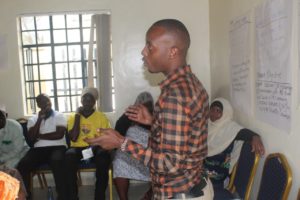|
Getting your Trinity Audio player ready...
|
By Sharon Kiburi
Nairobi, Kenya: A Kenyan youth-led organization was recently awarded for its outstanding efforts in fighting extremism in East of Nairobi’s Sprawling informal settlements.
The ‘Innovation Award’ was given to Kamukunji Community Peace Network (KACPEN) during the just ended United Nations General Assembly (UNGA) Conference.
The conference honored the Nairobi based youth group for their outstanding work among fellow youths. “Congratulations KACPEN! your project on Prevention and Countering Violent Extremism won the ‘Innovation Award’ at the UNGA Pioneers in SDGs Awards 2020”, a message from UNGA Pioneers in Sustainable Development Goals(SDGs) awards jury in NewYork read. They were selected from the 193 countries that form the UN General Assembly.
The UNGA Pioneers in the SDGs jury celebrate the Nairobi-based KACPEN as well as the great potential it inspires to educate other groups around the world in promoting programs that give youths hope and alternatives to radicalization and terrorist activities.
The precious award ceremony was conducted virtually at a virtual conference due to travel constraints of the COVID-19 pandemic.
KACPEN”s project stood out as an exemplary model that inspires others towards positive social change while contributing to the UN SDGs, especially goal 16: Peace, justice, and strong institutions.
This enables peaceful and inclusive societies; protecting human rights, the rule of law, and democratic values; empowering women, girls, and youth for social justice and equal opportunities play an essential role in achieving sustainable development goals.
Salim Juma, CEO of KACPEN, vaunted the organization’s history. “It was formed in 2014 and registered in 2018 as a Community Based Organization.”
He further noted that it is youth-led and driven by elders picked from men and women living in Kamukunji Sub-County as advisors. The main office is based at Majengo opposite the Pumwani Radha Mosque. KACPEN has grown in its network to involve many stakeholders, especially the ecumenical faith-based organizations.
“KACPENs mandate is to act as an advocate and catalyst for change to unite the community with increased, Cohesion, harmony, and safety where the underprivileged acquire knowledge, skills, and resources necessary to build self-sufficient and prosperous lives and serve leadership roles that positively influence the community growth and development. ” Salim said.
‘The current community membership is over 3000. Membership includes all groups bringing business fraternity, peace actors and builders, PCVE practitioners, persons living with disability, HIV & AIDS, Drama/Theatre Groups, Faith-Based Organizations, pro-youth against poverty and radicalization groups and Self-Help Groups among many other grassroots initiatives to address the various challenges affecting the Kamukunji residents.”
KACPEN in collaboration with USAID, Tangata University College, St. Teresa’s Catholic fraternity, and many others continues to help them. KACPEN’s good partnership with Tangaza University College created a unique community-led University program in Huruma to assist the community and especially the youth to learn how to solve problems around them.
“The Uniqueness of the University in the informal settlements (University Mtaani)is that, while students go to school to have their heads open up like a cauldron receiving food, which then they regurgitate and vomit back during exams to please the teacher and ministry concerned, this one was going to be different,” said Dr. Reginald Nalugala, Tutor in social transformation, Tangaza University and Pioneers in SDGs Awards UNGA Keynote speaker,2020.

Further, Dr. Nalugala noted that by following a Paolo Freirean methodology of engaging the community, the Institute for social transformation (formerly ISMM), Tangaza University, helped those in informal settlements learn to be their own solutions to their social problems.
The pedagogy involved students involving the community in reasoning together why things were what they were. “Why do you have flying toilets, what should we do about drainage, what about child pregnancy during hard times, why are well-educated youth joining criminal gangs, terror groups, etc,” said Dr. Nalugala.
















